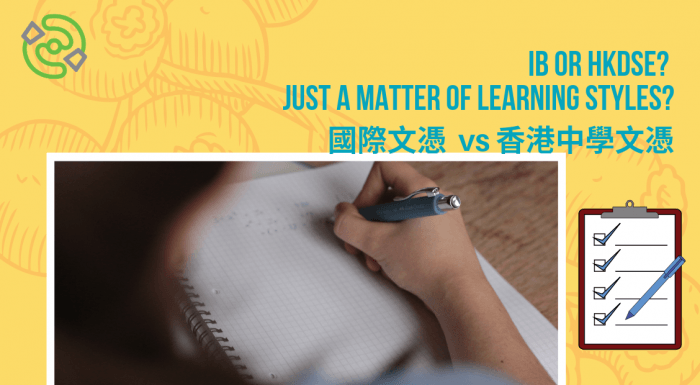
IB or HKDSE? Just a Matter of Learning Styles
Curriculum Structure of IB
The IB Diploma Programme is a 2-year internationally recognised programme. Students must pursue 6 subjects, 1 from each of the following disciplines:
- Language & Literature (typically in student’s Native language)
- Language Acquisition
- Individuals & Societies
- Experimental Sciences
- Mathematics
- The Art
3-4 of these subjects must be taken at higher level, and the rest at standard level.
In addition to their IB Diploma subjects, students must also complete three core requirements - Extended Essay (EE), Theory of Knowledge (TOK) and Creativity, Activity and Service (CAS).
For the Extended Essay, students are required to conduct independent research and write an essay of up to 4,000 words on a particular topic.
Students engage in experiential learning outside the classroom to fulfill their CAS requirement. For this, they are prompted to discover themselves in creative pursuits, in maintaining a healthy lifestyle, and in deepening their connection to society through services.
Theory of Knowledge is the pillar that epitomises the IB programme. The Theory of Knowledge sessions train students to think critically on the philosophical perspectives of knowledge itself. Philosophical perspectives including the source, nature and justification of knowledge. The main goal of Theory of Knowledge is to guide students in their quest to become critical thinkers, able to analyse knowledge and theories in a sceptical manner.
IB Diploma assessments are comprised of internal and external assessments. Internal assessments assess the work a student has completed throughout the 2-year period, and are carried out by teachers at their school. External assessments assess a student’s performance in exams and essays, and are marked by external examiners.
Curriculum Structure of HKDSE
The HKDSE is a 3-year senior secondary school programme devised in Hong Kong. HKDSE is an internationally recognized curriculum. Over 260 universities accept applications from HKDSE students. However, it should be noted that the international recognition of HKDSE falls short of IB in general. For example, in the United States there are a total of 47 colleges that accept HKDSE applicants. However statistics from West Island School (WIS), now an IB school, shows that WIS students alone have applied to and received offers from over 150 colleges in the States, showing much wider IB international recognition.
Most HKDSE candidates may take four core subjects (Chinese Language, English Language, Mathematics and Liberal Studies), plus two to three elective subjects.
HKDSE Compulsory Core Subjects:
- Chinese
- English
- Mathematics
- Liberal Studies
Some Common Elective Subjects:
- Physics
- Chemistry
- Biology
- Business, Accounting & Financial Studies (BAFS)
- Economics
- Information & Communication Technology
- Chinese Literature
- Literature in English
- History
- Chinese History
- Geography
- Visual Arts
The compulsory Liberal Studies module trains students to understand Hong Kong local and global issues. It also equips students with a critical mindset to evaluate information, formulate their viewpoints, and support those with adequate evidence.
School-Based Assessments (SBA) are also an integral part of the curriculum, in which students’ performance at school will be assessed. Typically, the weighting of SBA performance makes up 15-20% of the composite grade.
How do the IB and HKDSE qualitatively differ?
Assessment Mode
Compared to the IB, the HKDSE relies heavily on a student’s performance on the exam day. The grade weighting of non-examination assessments is lower than that of IB. While the external assessments for both curricula share similar weighting percentages in composite scoring, the external assessment of HKDSE consists solely of the public exam, whereas that of the IB consists of the exam as well as essays that are completed over an extended period of time. The IB is a more effective measure of a student’s usual performance outside the examination centre.
Objectives of the curriculum
The IB curriculum assessment mode, especially the essays, allows student to explore knowledge on deeper levels and closely resembles a liberal arts education. This encourages intellectual development, in contrast to a professional or technical curriculum. On the other hand, HKDSE assessment relies more on exams. The abundance of cram schools give us a hint that the HKDSE tends to be more exam-oriented rather than intellect-oriented.
Subject mix
In the IB curriculum, taking subjects from all 6 disciplines is compulsory, exposing students to a variety of subjects. However, not only are HKDSE students not required to take a mix of both Sciences and Arts subjects, but they are typically divided into Arts and Sciences streams upon starting their senior secondary education. The IB exposes students to a broad array of knowledge, while the HKDSE allows student to explore knowledge of more closely related subjects.
What do the students think?
Jon and Josh both graduated from a local secondary school that introduced the IB program as an alternative. Jon chose to take the HKDSE program. After the HKDSE, he went on to study Global Business and is now a financial analyst. Josh opted for the IB program, and is now a medical student in Hong Kong.
“Diversification is the hallmark of the IB, and the part I enjoyed the most,” said Josh, a medical student that has benefited a great deal from the IB program. “Diversification of IB comes in two ways: diversified subjects and stress. I had to take subjects from all disciplines that equipped me with a comprehensive outlook of the world. I believe I became more open-minded thanks to the IB program,” Josh added.
His open-mindedness is not only a result of the diverse subjects he studied. “The Theory of Knowledge component helped me question the way we know things,” Josh stated, “and every subject requires a certain degree of criticism. It helped me think critically.”
At the same time, the stress is spread over a longer period of time. “Scores accumulated as we finished our coursework over a period of time,” Josh explained. “I didn’t feel overly stressful in my IB exams.”
Now an avid dancer and surfer, Josh also found the Creativity, Activity and Service module enjoyable. “Not only did I voluntarily conduct some breakdance classes for kids, I also did a service trip in Thailand. That eased me up a bit amidst the stress of studying, and helped me affirm my determination to help people as my profession.”
As for the HKDSE, Jon (who graduated from an elite business programme and now works as a financial analyst) says “I appreciated the localised topics in Liberal Studies and I developed a deeper understanding of local affairs. It is good for anyone who wishes to stay in Hong Kong for their university education and career. However, the Liberal Studies subject still has room for improvement in terms of the number of topics that should be covered and the range of topics.”
Jon also commented on the HKDSE’s effectiveness in helping him earn a much-coveted admission place in an elite program. “I just had to study really hard and do well in the exams. It was really a once-and-for-all test for me. Some say it’s stressful, I will say it’s effective,” Jon said.
As SBA is a compulsory module in DSE, Jon also had to submit assessments for school teachers to evaluate his performance. “However, the SBA is not well executed,” Jon added. “The SBA does not help us apply the knowledge we have learnt. Students finish the assessments just for the sake of doing them.”
Conclusion
Different people have different learning styles. The choice between IB and HKDSE boils down to what students would like to achieve in their final years of secondary education. For students who see their university entrance exams as an intellectual exploration, long to be exposed to a variety of disciplines, and see their pre-university years as the opportunity to discover their true passions, the IB diploma may be a better curriculum for them. On the other hand, there are students who view university entrance exams as a gateway to help them get a much coveted university offer. These students might have a clear roadmap of their future - what they wish to major in at university, and their future career. These students might want to achieve a satisfactory result in a simpler and more efficient manner, through the good old ways of studying for an exam. Parents should guide their children to choose the curriculum best suited for them, and accompany them on whatever path they have chosen for themselves.
To see which secondary schools in Hong Kong offer the IB or HKDSE programmes, please go to https://whizpa.com/categories/schools








